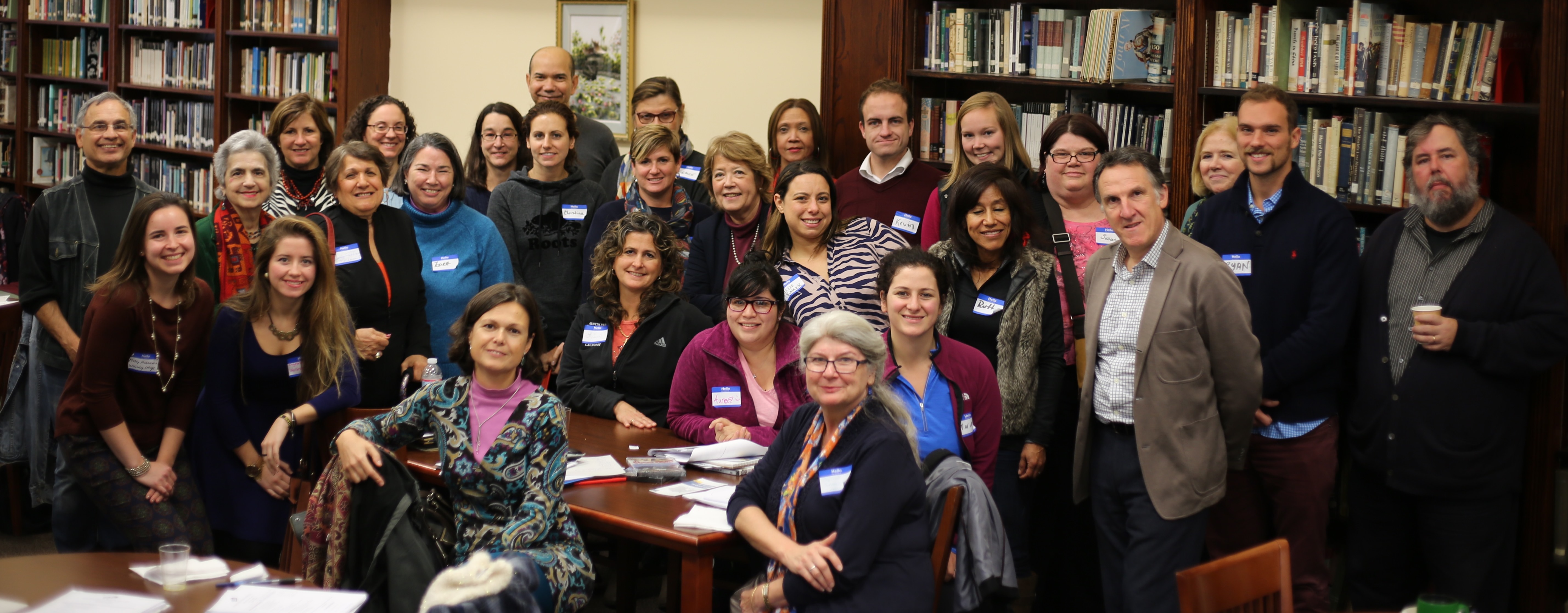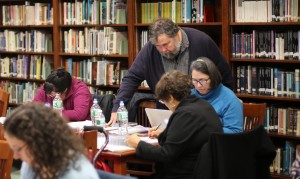The Necessity of Teaching Human Rights
When should one government intervene in the affairs of another country? When, if ever, should private civilians violate laws to participate in foreign wars? And how do we teach high school students to think about these questions? ALBA’s Peter Carroll considered these questions at the annual conference of the Ohio Council of Social Studies.
When ALBA launched its Teaching Institutes for secondary school teachers in 2008, the program focused on issues related to the Spanish Civil War and the motivations of the American volunteers of the International Brigades to undertake the dangerous business of going to war to help another country. Given the climate of U.S. politics in the 1930s—an era of appeasement and isolationism—it was appropriate to ask: When should one government intervene in the affairs of another country? When, if ever, should private civilians violate laws to participate in foreign wars? And in what ways were U.S. volunteers validated by the subsequent outbreak of World War II and the tremendous human suffering that followed?
Using ALBA’s large and unique collection of archival material, we introduced teachers to the stories of various volunteers, such as Hy Katz who wrote to his Jewish mother about why he went to Spain to protect Jewish people in other countries from the fascist menace, or the Jamaica-born volunteer Canute Frankson who explained to his friend in America why he, as a black man, had to fight against racist degenerates who supported Jim Crow laws and lynching. We placed the story of the Abraham Lincoln Brigade in the context of the coming of World War II and the Holocaust.
As we told that story, we began to extend our subject to include larger questions of civilian casualties, uprooted peoples, the effect of war on children—topics that linked the Spanish Civil War intimately with the big war the followed. Last October, ALBA’s former Chair, Peter Carroll, brought this story to the Ohio Council of Social Studies’ annual conference in Columbus as the featured speaker on the topic “From Guernica to Nuremberg: Teaching Human Rights in the Mid-20th Century.” He pointed out that this past summer the National Council for Social Studies endorsed the importance of teaching human rights issues at every level of education:
Human Rights Education, in both its civil and its humanitarian aspects, is a necessary element of social studies programs and should be integrated throughout the educational experience of all learners from early childhood through advanced education and lifelong learning
Human Rights Education is a necessary element of social studies programs. If you don’t address these questions in classrooms, no one else will.
Carroll’s talk integrated primary sources—such as Spanish children’s drawings in wartime and letters describing bombings of Spanish towns—with the narrative of human rights issues that foreshadowed the tragedies elsewhere. From the bombing of the Basque town of Guernica by German and Italian planes in 1937, Carroll showed teachers how to continue that theme through Allied and German bombing of open cities during World War II, ending with the atomic attacks on Hiroshima and Nagasaki. Besides creating enormous civilian casualties, such strategies also created refugee populations that demanded humanitarian aid. Ultimately, these horrors led to the Nuremberg tribunals and the U.N. Declaration of Human Rights.
Carroll urged his audience of Ohio teachers—about 40 attended the presentation—of the importance of teaching these matters as part of the regular social studies curricula for U.S. and World History classes. “These are not topics ordinarily discussed around a family’s kitchen table,” he said. “If you don’t address these questions in classrooms, no one else will. It’s our duty as teachers to prepare our students to become good citizens, moral citizens.”
Following the talk, two Master Teachers, Tracy Blake of Oberlin and Roberta Mucha of Columbus, presented four new ALBA lesson plans that specifically deal with these human rights subjects. ALBA provides this material free to all teachers for classroom use. They are available on our website: http://resources.alba-valb.org/
A Living Archive
By Andrés Fernández Carrasco
ALBA kicked off the teaching year with three institutes for high school teachers, bringing together nearly 100 educators to explore ways of incorporating the legacy of the Lincoln Brigade into their classrooms.
In Cambridge, Massachusetts, in a day-long program co-sponsored by the Massachusetts chapter of the American Association of Teachers of Spanish & Portuguese (AATSP), and Collaborative.org, ALBA’s James D. Fernández (NYU) and Carlos Ramos of Wellesley College brought their archival projects and cultural studies to teachers of Spanish in the Boston area. Amelie Baker, a teacher at the Boston Latin School and member of collaborative.org, also offered a discussion sponsored by the Library of Congress on strategies for the effective use of primary source materials in high school classes.
On Election Day in November, 38 high school teachers from New York City, as well as a few from Connecticut, attended the workshop led by ALBA’s Chair Emeritus Peter N. Carroll and James Fernández. Teachers from a variety of disciplines studied documents written by Spanish Civil War volunteers like Evelyn Hutchins, Canute Frankson and Hy Katz. They discussed, for example, how a Spanish folk song that had been transcribed, arranged and recorded by Federico García Lorca would end up being sung, with transformed lyrics, by the legendary Paul Robeson. And together, the teachers worked out ways to make these types of primary sources available and meaningful to their students.
The following day, Carroll and Fernández also ran the most recent teaching institute at Bergen County Academy in New Jersey. The workshop was held in the classroom of history teacher Sergei Altschen, an alumnus of the very first workshop organized by ALBA in 2007; both Sergei and Gabriela Calandra, a Spanish teacher at Bergen, and also an alumna of that same institute, explained how they have made ALBA a center piece of their teaching ever since.
Based on the reactions (and, in many cases, requests) of the participants in these three workshops, there will be follow-up institutes next year. As Tim Casperson, administrator of Bergen County social studies, put it: “Teachers become invigorated by these workshops and the materials presented in them. The experience of the ALBA institutes reminds them of why they became teachers in the first place. And you can see at the end of the day how they are excited about finding ways of introducing their students to this material.”
Andrés Fernández Carrasco, a recent graduate of Wesleyan University, is ALBA’s newly-appointed Education Coordinator.














